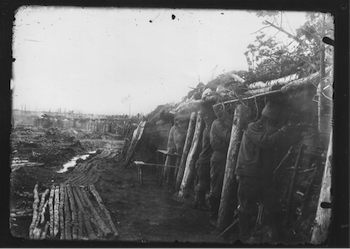

|
Russia's Military Weaknesses From the autumn the Eastern Front began to stabilize as the war of mobility gave way to a war of position. Sweeping offensives like those of August were abandoned as the armies discovered the advantages of defensive warfare and dug themselves in. One entrenched machine-gunner was enough to repel a hundred infantrymen, and railways could bring up defenders much faster than the advancing troops could fill the gaps in the front line. It was at this point that Russia's military weaknesses began to make themselves felt. Russia was not prepared for a war of attrition. It had by far the largest population of any belligerent country. Yet it also was the first to suffer from manpower shortages. Because of high birth-rates a large proportion of the Russian population was too young to be mobilized.  Russian Trenches More serious still was the weakness of the Russian reserves. To save money the army had given little formal training to those beyond the First Levy. But there were so many casualties that it soon found itself having to call on the poorly trained men of the Second Levy. The top commanders were drawn from a narrow circle of aristocratic cavalrymen and courtiers without much experience of war. They conducted the war after the pattern of a nineteenth century campaign, asking their men to storm enemy artillery positions regardless of casualties; wasting resources on the ineffective cavalry; defending useless fortresses in the rear; and neglecting the technological needs of modern artillery warfare. They scorned the art of building trenches, which on the Russian side were so primitive that they were little more than graves. As the war dragged on through the winter the army began to experience shortages of materiel. Russia's transport network could not cope with the massive deliveries of munitions, food, clothing, and medical care to the fronts. Munitions shortages were the most acute. The War Ministry had run down the armaments industry, assuming it could make do with existing stocks, and now had to place new orders for shells and guns abroad which were slow in arriving. As conditions at the Front worsened and the scale of the slaughter increased, the army's morale and discipline began to fall apart. The internal war between the soldiers and their officers - the front on which the Revolution would be fought - began to overshadow the war itself. The root of the problem was the rapid depletion of the officers corps as a result of casualties. The newly trained NCOs who took over the junior command posts were mostly younger peasant men and artisans whose sympathies lay with the troops. |
© 2014 Orlando Figes | All Rights Reserved